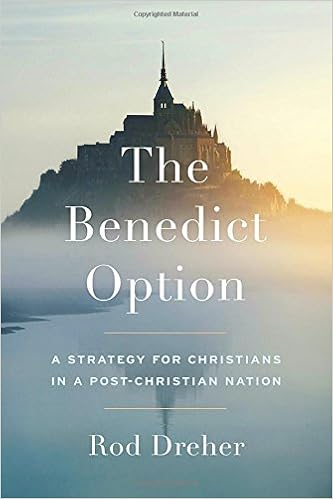 So, I’m usually a day late and a dollar short when it comes to talking and writing about the “buzz books”—the ones everyone seems to be discussing at any given time. And since I was on a blog break for Lent, that makes me even later in my entry to the discussion. Nevertheless, I did read both The Benedict Option by Rod Dreher and Hillbilly Elegy by J.D. Vance while I was “lenting”, and both are books which shed some light on current events and trends and decisions yet to be made.
So, I’m usually a day late and a dollar short when it comes to talking and writing about the “buzz books”—the ones everyone seems to be discussing at any given time. And since I was on a blog break for Lent, that makes me even later in my entry to the discussion. Nevertheless, I did read both The Benedict Option by Rod Dreher and Hillbilly Elegy by J.D. Vance while I was “lenting”, and both are books which shed some light on current events and trends and decisions yet to be made.
I agree with many other writers about Mr. Dreher’s book. Holly Ordway writes, “I would say that Rod Dreher’s The Benedict Option has some strengths and a number of weaknesses, but one thing I am sure of: it’s great that it’s prompting discussion about Christian cultural engagement!” Her contribution to the discussion is worth the read, even though she seems to say (rather oddly) that the real Benedict Option should not reference Benedict so much nor is it possible for anyone other than Catholics and maybe Orthodox believers. I say oddly because Ms. Ordway teaches in the apologetics program at Houston Baptist University. Maybe she has learned more about evangelicals and their ability to create sustainable communities in her interactions with HBU and all those Baptists than I know from my fifty plus years of being an evangelical Christian. But I really think it is possible to have the Holy Spirit work in us and through us to create Christian community without Catholic liturgy and without believing in the actual presence of Christ in the Eucharist. I’ve seen it done, albeit imperfectly, in many churches and para-church groups.
That detour aside, the call for community and community-building in Mr. Dreher’s book is a topic dear to my own heart, and I am glad to see it treated with the serious consideration and wide-ranging discusion that it deserves. I wish Mr. Dreher’s book could have been longer and more specific about exactly how to build, maintain, and repair communities, but he spends most of his 272 pages writing about the need for Christian community and writing about some examples of burgeoning attempts at community both in the United States and in Europe, Italy in particular. Some of the communities Mr. Dreher references are monastic, but most are loosely organized communities, either ecumenical in nature or built around a specific church or denominational entity. Most include families and singles and people of all ages.
I think most helpful in Mr. Dreher’s book is a call to build, not monastic or cultic communities, but rather institutions that encourage and sustain Christian faith and community in the face of a secular onslaught of God-denial. He writes about home schooling and private schools as community building institutions. He also writes about discussion groups and communities built around daily worship and activities at a nearby, local church. And about hospitality and the wise use of technology and social media.
Dreher’s book has been widely lauded, but also widely criticized for what it leaves out. He doesn’t write about how the black church has preserved the faith and its own existence through community building. He doesn’t write about Anabaptist traditions and communities. Nor does he interview or write about Christians who have lived through real persecution under Communism or other non-Christian governments and cultures. How did these and other Christian communities survive cultural marginalization and political powerlessness? Dreher also doesn’t really speak to or about poor people or non-Westerners or Hispanics or you name it. He’s writing from a white, middle class, Western perspective, and that’s OK by me, partly because he makes an effort to include Catholics and Protestants as well as Christians from his own (Eastern Orthodox) tradition and partly because many of those other categories include me. If you want the “Benedict Option” (or whatever you want to call serious Christian commitment to community and faith preservation and evangelization) to be applied to people in poverty or African Americans or Native Americans or Cambodians or Pacific Islanders, write your own book and show how and why it should be done.
Which brings me to the second book that I was going to write about in this post, Hillbilly Elegy. However, I think I’ll finish up with some links to other thoughts about The Benedict Option and write about Hillbilly Elegy another day.
Top Christian Thinkers Reflect on The Benedict Option.
If Politics Can’t Save Us, What Will by Collin Hansen.
I’ve seen this title floating around but hadn’t investigated what it was about. Thanks for explaining.
I have The Benedict Option on my To Read Someday Wish List. Most of what I have read about it has been positive. I loved his book called Crunchy Cons.
I’m interested in seeing what you have to say about Hillbilly Elegy. I haven’t even perused it but some of the other reviews I found to be putting conservatives (especially from the Midwest and South) down. Will be looking for yours!